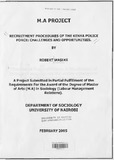| dc.description.abstract | The study examined the recruitment procedures and practices of the Kenya
Police Force, and sought to determine their consequences. Jolted by rapid and
continuing developments in technology, changes in organization structure,
legislation and patterns of crime, the Kenya Police Force sometimes seemed
more disabled than enabled to fulfill its obligations due to having some dishonest
and unprofessional officers in the system. In view of this, the study was aimed at
documenting Police recruitment procedures and their consequences vis-a-vis the
opportunities that would shape the image of the entire Police force.
The study was carried out in thirteen research sites within Police Department
across the entire country. Serving Police officers posted across the country were
targeted for the study. Ten percent of the accessible population was used to
identify 111 respondents. The population under study was further subjected to
stratified random sampling. To capture variability of characteristics of population
under study, three strata for Police Commanders (Gazetted officers), Members of
the Inspectorate (middle level officers), and members of other ranks (Non- '
Commissioned officers) were created before 37 respondents from each stratum
were identified
From the study findings, it was established that there was insufficient
information used in carrying out an effective recruitment exercise. The majority's
view amongst Members of the Inspectorate and Non-Commissioned Officers was
that recruiting officers were not competent enough for the exercise. However,
while most Gazetted Officers found them to be competent, there were also many
Gazetted Officers who perceived them to be incompetent.
The majority view suggests Police Commanders' lack of independence in carrying
out the recruiting exercises. Respondents' perceptions of whether Police officers
understood and followed correct recruitment procedures show varied opinions.
The majority of the Gazetted officers and Members of the Inspectorate were of
the opinion that correct recruitment procedures were understood but never
followed. However, the majority of Non-Commissioned Officers were of the view
that Police officers did not understand and did not follow the correct recruitment
procedures.
The common consequences of the actual recruitment patterns of the past include
poor service delivery, poor public relations, dissatisfaction amongst officers and
increased corruption. Likewise, the majority of respondents from all categories of
officers held the view that the Police Departments' resources were inadequate.
From the study findings, we see that insufficient information undermines the
success of the exercise of defining and attracting qualified personnel.
Ineffectiveness in defining and attracting qualified personnel adversely affects
the whole exercise and compromises its success. The inability of Police officers to
effectively understand and follow correct recruitment procedures also hampers
the success of the exercise. Likewise, the inadequacy of resources inhibits the
implementation of proper recruitment procedures.
Greater efficiency could be achieved if officers irrvolved in the recruitment were
competently identified and Police commanders' independence secured from
undue influence, especially from external forces. All forms of bias should be
eliminated and proper sensitization of officers carried out by competent
personnel. Police Department should have adequate resources for the
recruitment exercise and should formulate modern and effective recruitment
policies which could be used to govern the entire exercise. | en |

